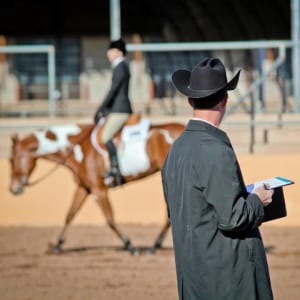Concerns about recent confirmed cases of contagious equine viruses have spurred several organization to postpone APHA-approved shows scheduled for May 9–10. The Arizona Paint Horse Club will postpone its Summer Celebration show in Scottsdale due to confirmed local cases of Vesicular Stomatitis Virus. The Southwest Washington Paint Horse Club will postpone its ColorPalooza show in Albany, Oregon, due to confirmed cases of Equine Herpesvirus-1 in Oregon.
Vesicular Stomatitis Virus
Vesicular Stomatitis Virus (VSV) has been confirmed in two horses in Maricopa County, Arizona. VSV is a contagious virus causing blister-like sores on the mouths, noses and sometimes feet of infected animals. The VSV-affected horses are quarantined, and the Arizona Department of Agriculture is testing animals from a total of eight locations in Maricopa County, according to the agency’s May 1 press release.
“Vesicular Stomatitis Virus mainly affects equine and to a lesser extent cattle and swine,” Arizona State Veterinarian Dr. Perry Durham said. “It can be painful for animals and costly to deal with.”
The blisters are most likely to affect the mouth, the tongue and around the nose/muzzle. Pain from the blisters can make it hard for the animal to eat and drink. If cattle are infected, often the hooves and teats are involved leading to severe economic impact in dairy cattle. In cattle, this virus is basically visually indistinguishable from Foot and Mouth Disease, a highly contagious and devastating disease. Tests on the affected steer for Foot and Mouth Disease came back negative. The affected horses seem to be sicker with this outbreak than the small outbreak Arizona saw earlier this year.
As a precaution, the Arizona Paint Horse Club Executive Board voted to postpone the club’s APHA-approved Summer Celebration show, originally scheduled for May 9–10.
From the club’s Facebook page:
MAY SUMMER CELEBRATION EXHIBITORS: Many of our members are aware of the press release from the Arizona Department of Agriculture dated May 1, 2015, regarding confirmed cases of Vesicular Stomatitis Virus in Maricopa County.
Upon the recommendation of local veterinarians, the APHC Executive Board voted on 5/4/15 to postpone the APHC Summer Celebration in the best interest of the health of our exhibitors’ horses.
While we expect this to subside, we wish to be as cautious as possible out of respect for our exhibitors. We may have some postponement dates for you very soon, so please watch our website and Facebook page for updates as we determine alternative dates. If you have submitted stall payments, we will be notifying and working with our exhibitors as quickly as our volunteer time allows, but will be as diligent as we can to get refunds completed. Your entries will be automatically canceled by our show secretary.
Please share this information as it is stated so there is no misinformation being spread. Our concern for your horses’ health and well-being is of utmost importance to the Arizona Paint Horse Club.
As of May 6, APHA has not received word about cancellations due to VSV from any other APHA-approved shows.
According to another May 1 press release, the New Mexico Livestock Board has confirmed two cases of vesicular stomatitis, detected in horses located in New Mexico’s Grant and Otero counties. The livestock on those are under quarantine by the New Mexico state veterinarian.
Veterinarians and livestock owners who suspect an animal may have Vesicular Stomatitis or any other vesicular disease should immediately contact State or Federal animal health authorities. Livestock with clinical signs of Vesicular Stomatitis are isolated until they are healed and determined to be of no further threat for disease spread. There are no USDA approved vaccines for Vesicular Stomatitis.
Though very unusual, people can be infected with the virus. In these situations, it is usually among those who handle infected animals (for example while inspecting a horse’s mouth and the horse coughs in the person’s face, thereby delivering a large dose of virus onto the person’s eyes and lips). Vesicular Stomatitis Virus can cause flu-like symptoms and only rarely includes lesions or blisters in people. More information about Vesicular Stomatitis is available online.
Equine Herpesvirus-1
According to a May 4 press release from the Oregon Department of Agriculture, four Oregon horses have tested positive for Equine Herpes Virus (EHV-1) with two of the horses showing neurological symptoms. It was confirmed last week that a Marion County horse had tested positive for EHV-1 and had developed neurological symptoms. The second horse that developed neurological symptoms resided at a stable in Polk County with about 40 other horses and was taken to the Large Animal Hospital at Oregon State University’s College of Veterinary Medicine over the weekend. The Polk County stable has been placed under quarantine and the remaining horses are being monitored by the stable manager and a veterinarian.
In addition to the Polk County stable, two Marion County farms remain under quarantine due to exposure to EHV-1. The infected horses and other horses exposed at the quarantined facilities attended an Oregon High School Equestrian Team (OHSET) meet at the Linn County Fairgrounds on April 16-19. ODA is currently investigating the potential of any additional exposures at this time. In addition, ODA is working to notify owners of horses that have been potentially exposed and has notified Oregon equine veterinarians. In light of the recent EHV-1 cases, the Southwest Washington Paint Horse Club has cancelled its May 9–10 ColorPalooza show in Albany, Oregon.
From the Southwest Washington Paint Horse Club website :
Due to fears over the recent outbreak of the EHV-1 virus, we have decided to cancel our show this weekend – May 9th & 10th. We are especially sad since this was our 40th Anniversary Celebration – but not to worry, we are committed to re-scheduling our show for a later date in 2015 and sincerely hope that you will make plans to join us for our ColorPalooza show in 2015 – check back often or keep an eye on our Facebook postings regarding the new date. Thank you.
As of May 6, APHA has not received notice of any other APHA-approved shows or events cancelled due to EHV-1.
EHV-1 is not transmissible to people. The virus is naturally occurring and widespread in the equine population. It is a common virus and may lie dormant for long periods of time and then re-activate during a period of stress, which can result in clinical disease. EHV-1 can cause respiratory disease, abortions in pregnant mares, neurologic disease, and in severe cases, death. The most common way for EHV-1 to spread is by direct horse-to-horse contact. The virus can also spread through contaminated equipment, clothing, and hands. Symptoms include fever, decreased coordination, nasal discharge, urine dribbling, loss of tail tone, hind limb weakness, leaning against a wall or fence to maintain balance, lethargy, and the inability to rise. While there is no cure, the symptoms of the disease may be treatable.
As a reminder, Oregon State Veterinarian Dr. Brad LeaMaster advises horse owners to practice strict biosecurity measures and hygiene if they travel to shows and competitions with their animals. Concerned owners should contact their veterinarian if they have questions.
CLICK HERE for more from APHA.com









